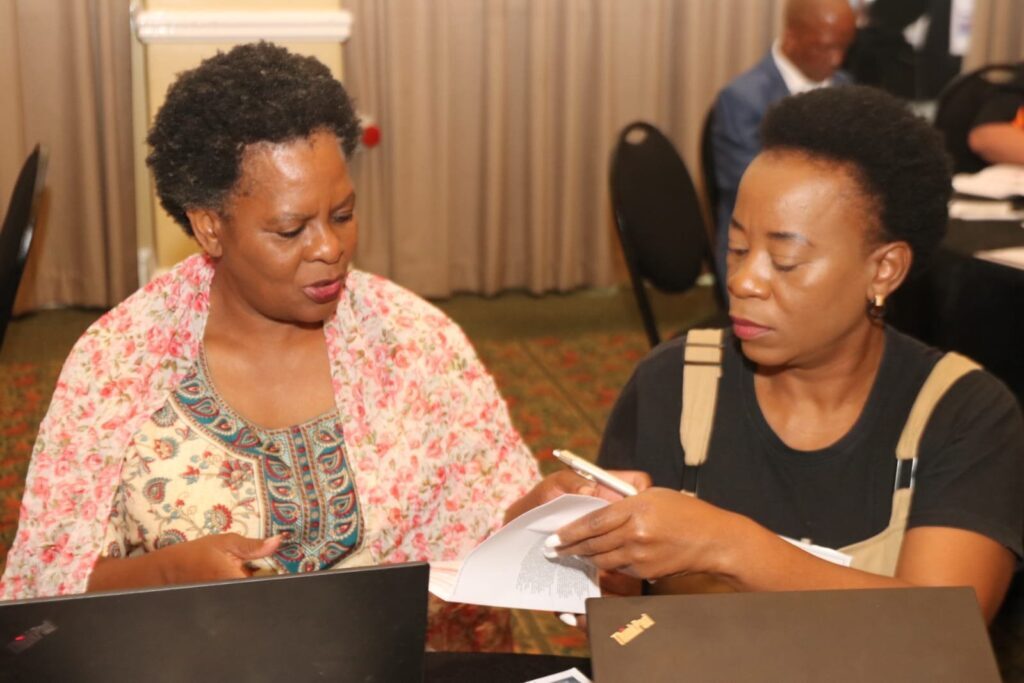Edwin Naidu
In a boost for public school teachers throughout South Africa, the Minister of Finance Enoch Godongwana has announced an additional R25.7 billion in the Budget for the education sector for the carry-through costs of the wage increase over the medium term.
But the tertiary sector is facing severe cutbacks amounting to close to R5 billion, which will lead to delays in infrastructure development.
At the same time, Godongwana said the National Treasury was able to protect the budgets of critical programmes such as the school nutrition, which provides food to pupils in almost 20,000 schools. The early childhood development grant is allocated R1.6 billion, which will rise to R2 billion over the medium term.
According to the National Treasury Expenditure overview, over the medium term, the department will continue to focus on accelerating the delivery of and improving school infrastructure, providing educational opportunities to learners with severe to profound intellectual disabilities, enhancing teaching and learning by ensuring access to high-quality learner and teacher support materials; increasing the supply of quality teachers and preparing teachers to teach new subjects that will prepare learners for a changing world; improving the quality and reach of early childhood development (ECD) services; and providing nutritious meals for learners through the national school nutrition programme.
Transfers and subsidies, mostly for conditional grants to provinces, make up 85.3 per cent (R86.8 billion) of the department’s allocation over the MTEF period, increasing at an average annual rate of 5.9 percent, from R25.3 billion in 2023/24 to R30 billion in 2026/27.
Cabinet-approved reductions of R2.8 billion over the medium term are effected on various programmes, including the school infrastructure backlogs grant (R1.2 billion), the education infrastructure grant (R611 million), the Funza Lushaka bursary scheme (R397.9 million) and workbooks (R97 million). Total expenditure is set to increase at an average annual rate of 5.3 per cent, from R30 billion in 2023/24 to R35.1 billion in 2026/27.
The department is committed to ensuring all schools have safe and appropriate infrastructure. This is delivered through the education infrastructure grant and the school infrastructure backlogs grant, which account for 95.8 per cent (R47.6 billion) of spending over the MTEF period in the Planning, Information and Assessment programme.
The education infrastructure grant’s allocation of R42.3 billion over the period ahead will be transferred to provinces as supplementary funding to accelerate the construction, maintenance, upgrading and rehabilitation of new and existing infrastructure in the basic education sector.
The school infrastructure backlogs grant addresses infrastructure backlogs at schools that do not meet the norms and standards for basic school infrastructure. This grant is allocated R5.3 billion over the MTEF period, which will be used to replace a targeted 100 inappropriate and unsafe schools with newly built schools, and to provide water to 350 schools, sanitation to 320 schools and 220 additional classrooms to address overcrowding.
Cabinet-approved reductions of R1.2 billion to the school infrastructure backlogs grant and R611 million to the education infrastructure grant will delay projects still in the planning phase so that those currently being implemented can be completed.
The Learners with profound intellectual disabilities grant aims to improve the provision of quality education to learners with severe to profound intellectual disabilities. The grant is expected to provide access to quality publicly funded education to more than 13,000 such learners over the MTEF period through an allocation of R874.7 million in the Curriculum Policy, Support and Monitoring programme.
Providing high‐quality learning materials Recognising that quality learning materials enhance the effectiveness of teaching and learning, the department plans to print and deliver grades R to 9 life skills, languages and mathematics workbooks to all public schools that request them.
An estimated 60 million workbooks will be provided to about 9 million learners in each year of the MTEF period. To fund this, R3.9 billion is allocated over the period ahead in the Curriculum and Quality Enhancement sub programme in the Curriculum Policy, Support and Monitoring programme.
Despite Cabinet-approved reductions of R97 million to the programme’s budget over the MTEF period, the department still expects to print and distribute all workbooks requested by schools by maximising cost-saving measures, particularly on printing.
Increasing the supply of quality teachers The Funza Lushaka bursary scheme provides bursaries to prospective teachers to address critical educator shortages in priority subject areas such as inclusive education, mathematics, coding, robotics, and science and technology.
Despite Cabinet-approved reductions to the programme’s funding amounting to R397.9 million over the MTEF period, the department plans to increase the number of bursaries awarded from 9,700 in 2024/25 to 10,300 in 2026/27.
This will be done by funding more students completing the one-year postgraduate certificate in education and increasing the number of bursaries awarded to institutions with lower fee structures.
The bursary scheme is allocated R4 billion over the MTEF period in the Teachers, Education Human Resources, and Institutional Development programme. Improving Early Childhood Development Services in provinces is supported by the Early Childhood Development grant of R5.6 billion over the MTEF period to provide subsidies for children accessing ECD services, infrastructure support to ECD providers and pre-registration support packages, and to pilot the construction of low-cost ECD centres. An additional R197 million in 2024/25 is earmarked for piloting a nutrition support programme that targets low-cost ECD centres.
The department plans to continue providing nutritious meals to more than 10 million learners each school day at 19 950 schools each year over the period ahead, in line with the National Development Plan’s priority of eliminating poverty and supporting food security. The national school nutrition programme grants funds the programme, and it allocated R30.9 billion over the MTEF period in the Educational Enrichment Services programme.
Turning to the tertiary sector, the Expenditure overview noted that as part of implementing its mandate, the Department of Higher Education and Training oversees universities, TVET colleges, CET colleges, SETAs, quality councils and private education providers. Its goals include expanding access to higher education and training opportunities and improving the quality of the provisioning, responsiveness and efficiency of the post-school education and training system.
It aims to give effect to these goals over the medium term by focusing on upgrading ailing infrastructure at higher education institutions and providing bursaries and loans to students from poor and working-class backgrounds.
The department’s expenditure is expected to increase at an average annual rate of 4.8 per cent, from R130.5 billion in 2023/24 to R150.2 billion in 2026/27, driven mainly by transfers and subsidies to departmental agencies, accounts, and higher education institutions. These account for an estimated 90.6 per cent (R389.8 billion) of total spending over the period ahead.
Spending on compensation of employees’ accounts for an estimated 8.6 per cent (R37.3 billion) of the total budget over the same period, mainly in the Technical and Vocational Education and Training programme for TVET college lecturers (R26.6 billion) and the Community Education and Training programme for CET college lecturers (R8.6 billion).
Cabinet-approved reductions amounting to R27 billion over the medium term are mainly on transfer payments to the university infrastructure and efficiency grant, TVET infrastructure and efficiency grant, university subsidies, and the National Student Financial Aid Scheme. Of these reductions, an estimated R4.9 billion over the MTEF period is on university subsidies.
Although these subsidies are set to be reduced over the period ahead, the main funding source for universities is set to increase at an average annual rate of 3.7 per cent, from R44 billion in 2023/24 to R49 billion in 2026/27. To accommodate the reduction, universities must implement cost-containment measures – including revisiting contracts and reducing travel and subsistence costs. This considers the expected increase in university enrolments from 1.1 million in 2023 to 1.2 million in 2027.
Upgrading ailing infrastructure at higher education institutions will suffer as the reductions of R6 billion to infrastructure grants over the MTEF period are expected to delay the start of new capital projects.
They will also ensure closer alignment with the sector’s capacity to spend infrastructure allocations, as these grants have been underspent in recent years. The department plans to ensure institutions have appropriate infrastructure to accommodate students accessing higher education.
The university infrastructure and efficiency grant is allocated R4.5 billion over the medium term, decreasing at an average annual rate of 24.3 per cent, from R2.2 billion in 2024/25 to R1.2 billion in 2026/27.
The TVET infrastructure and efficiency grant is allocated R539.4 million over the same period, decreasing at an average annual rate of 41.7 per cent, from R491.9 million in 2023/24 to R97.6 million in 2026/27.
Despite these decreases, these allocations will enable infrastructure repairs and maintenance in priority areas such as bulk services, sanitation, teaching and learning facilities, and student accommodation. Allocations amounting to R989.4 million will be used to construct basic skills centres, teaching and learning facilities, workshops and ICT laboratories at CET colleges.
The department will ensure that all students offered a place to study at a university or TVET college based on academic merit will be afforded that opportunity. The National Student Financial Aid Scheme provides bursaries that cover tuition at these institutions and living expenses to students from families earning below R350 000 per year. Despite reductions of R16 billion over the MTEF period, transfers to the National Student Financial Aid Scheme to provide a projected 2.9 million students with loans and bursaries are expected to increase at an average annual rate of 3.6 percent, from R45.6 billion in 2023/24 to R50.8 billion in 2026/27. The reductions will, however, affect the number of bursaries the scheme can award over the medium term.
INSIDE EDUCATION


